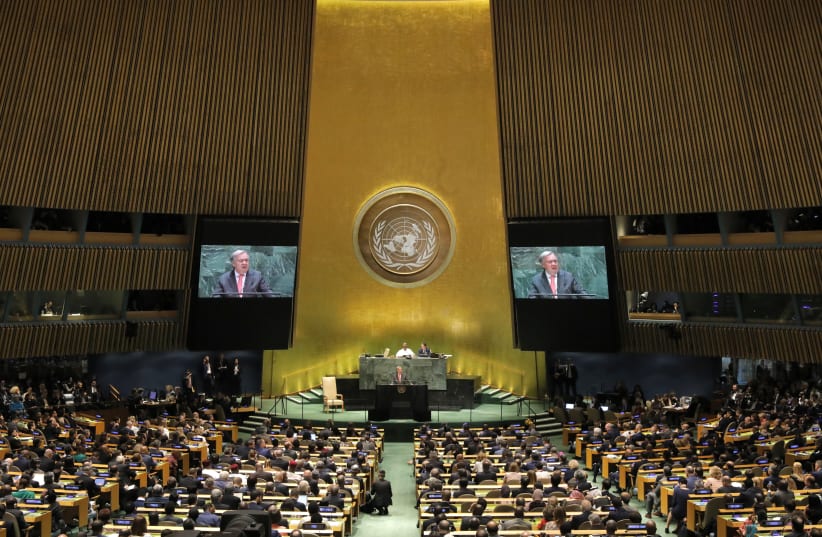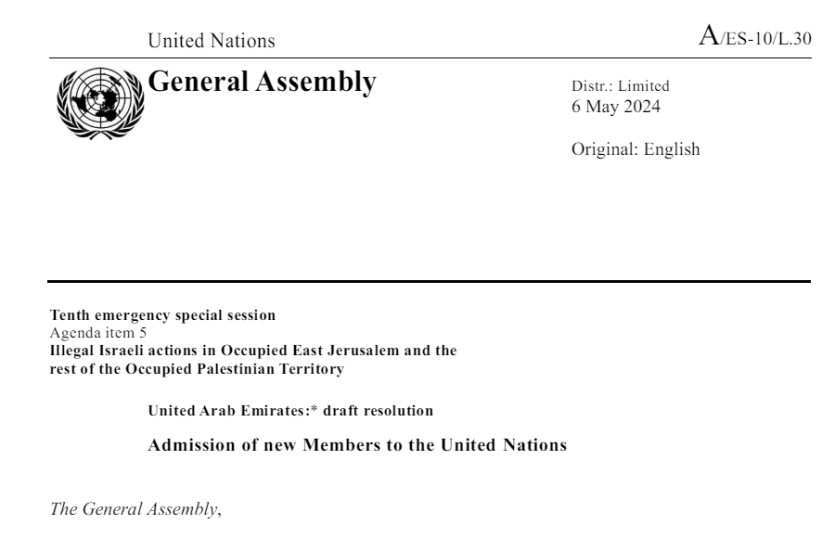The United Nations General Assembly (UNGA) is expected to upgrade the Palestinian status at the UN, granting it almost all statehood rights within its plenum short of allowing it to vote.
The United Arab Emirates is expected to submit a resolution, a draft text of which was seen by The Jerusalem Post, calling on the United Nations Security Council to grant Palestine full membership status in the UN.
The text, which is likely to have majority support, states that “Palestine is qualified for membership in the United Nations in accordance with article 4 of the Charter and should therefore be admitted to membership in the United Nations.”
The Palestinian Authority, through the UAE, turned to the General Assembly after the United States vetoed its membership application to the United Nations Security Council (UNSC) last month. The US is one of five permanent UNSC members with veto power.
The UAE resolution “recommends” that the Security Council “reconsider the matter favorably,” but in essence, its text seeks to circumvent the UNSC's sole power to determine UN membership.
UNGA resolutions, however, cannot be vetoed, and the PA has automatic majority support in the UNGA, where some 140 of its members already independently recognize Palestine as a state.
The UNGA does not have the formal power to grant Palestinians UN membership, but it can provide them with de-facto recognition that allows them to operate as a state within the UN system.
In 2012, the UNGA voted 138-9 to grant the Palestinians the status of a non-member observer state. This move allows them to participate in UN forums and sign many of its statutes and treaties, including the Rome State, which governs the International Criminal Court.
Not statehood, but similar status
According to the current draft of the resolution, this Friday, the UNGA would grant Palestine the right to operate within its plenum as a member state, granting it almost everything but the right to vote, which would need UNSC approval.
The resolution affirms “the right of the Palestinian people to self-determination, including the right to their independent State of Palestine.”
In practice, the State of Palestine could be seated among the member states and be granted broad rights to address the plenum on its behalf or that of groups.
The Palestinians could submit resolutions, proposals, and amendments on their own behalf or on behalf of groups within the UN system.
If the resolution is approved, the Palestinians could also participate in high-level meetings and international conferences, where they would have voting rights.
Western states, especially the United States, have opposed unilateral recognition of Palestinian statehood, believing that it should be granted upon completion of a final status peace agreement for the two states.
Given that negotiations for a two-state resolution to the Israeli-Palestinian conflict have been frozen for a decade and in light of the Gaza war, there is growing support among Western states for unilateral Palestinian statehood.
Israel’s government has opposed Palestinian statehood, but in stating unilateral Palestinian statehood, it agreed that such statehood should only be achieved through a negotiated process.
It has argued that Palestinian recognition, in the aftermath of the Hamas attack on southern Israel in which over 1,200 people were killed and another 252 seized as hostages, was a reward for terror.
“Recognizing a Palestinian State after October 7 means rewarding Hamas for murdering over 1,000 Israelis,” Israel’s Foreign Minister Israel Katz said in a post on X on Wednesday.
Recognizing a Palestinian State after October 7 means rewarding Hamas for murdering over 1,000 Israelis. It means giving a prize to the Iranian Regime. It means living with the possibility of another October 7. The only way to promote peace is through direct… pic.twitter.com/DFRQiX91Vm
— ישראל כ”ץ Israel Katz (@Israel_katz) May 8, 2024
“It means giving a prize to the Iranian Regime. It means living with the possibility of another October 7.
“The only way to promote peace is through direct negotiations within the framework of a regional normalization process,” he said.

